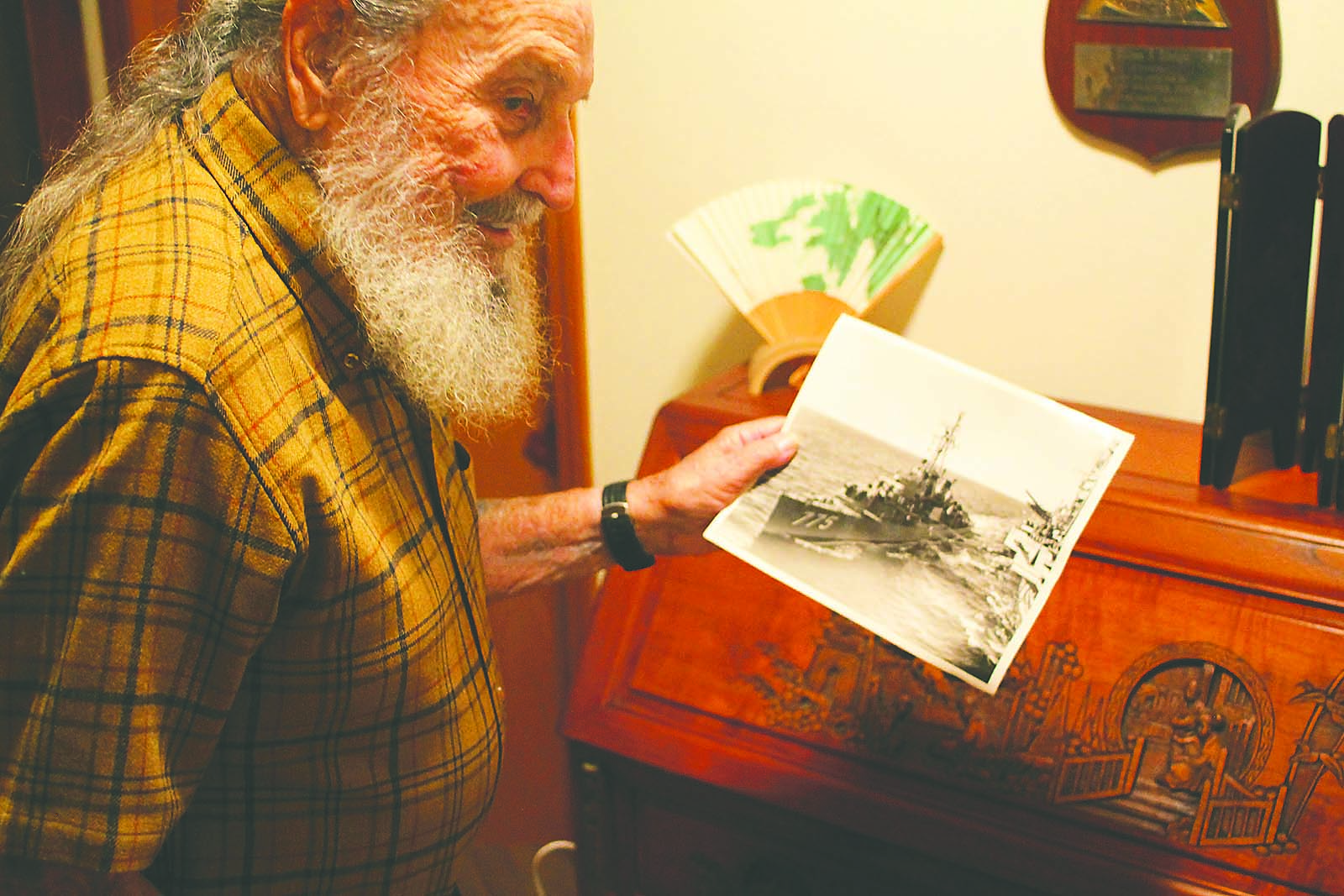When Bill Albright crossed the equator for the first time, he crawled through the garbage chute of a submarine chaser and kissed King Neptune’s dirty belly.

That was part of the rite of passage for Navy men who crossed into the Southern Hemisphere for the first time, Albright said. Shellbacks – those who have crossed before – dressed up as part of King Neptune’s royal court and welcomed the newcomers to the southern hemisphere.
Albright tattooed the date of his initiation on his right arm: April 1943.
The Lebanon resident was born in Philadelphia and served in the Navy during World War II, the Korean War, the Cold War, and Vietnam. He began his 26-year service to his country by lying.
“I bailed out of school, and with some ink eradicator and a pen I changed my birth certificate and got in the Civilian Conservation Corps,” he said.
A few months later, Albright was returning to camp from leave when he got some news that would take his life offshore.
“I come into the place and everybody’s around the radio and they said the Japs bombed Pearl Harbor. I thought, ‘What the hell’s a Pearl Harbor?’”
At the age of 16, Albright walked into the nearest recruitment office and was sworn into the Navy on Dec. 12, 1941. He spent four weeks in boot camp before boarding his first ship.
“You went in and they took all your clothes, all your hair, and you were reborn,” he said.
His first assignment was aboard a fleet tanker hauling aviation gas up and down the east coast, followed by a three-year stint on submarine chasers during which time they ran convoys in the Atlantic. After that, as the war was winding down, Albright worked on a gasoline and ammunitions carrier along the Pacific.
He didn’t know what to do with himself when “his war” was over, he said, so he returned home to pursue an education. The powers that be, however, insisted he return to high school, but as a 20-year-old first class petty officer, that plan just wasn’t going to work for him.
So he re-enlisted, expecting a nice station on the east coast, but instead was placed on a target ship at Bikini Atoll where the U.S. tested atomic bombs.
Albright eventually decided it was time to put in for submarine school, in which he finished 13th of 82. He initially only wanted to work subs so he could draw hazardous-duty pay, he said, but ultimately he grew to love working aboard submarines despite the tight quarters.
Canned goods were stored on the floor, and Albright’s bed was situated between torpedoes. Even the camaraderie was tight.
“The finest bunch of people I served with was on a submarine,” he said.
He attributes the fraternity to the fact they all have to depend on each other in order to stay alive.
“A submarine is a very sophisticated piece of machinery,” Albright said. “If one person screws up, he can sink that thing or cause a major casualty.”
After serving underwater four years, orders were sent to station him for recruitment duty and then he went to work on amphibious ships during the Korean War. His work involved dumping Marines on the beach, but they were also ordered to relocate citizens from North Vietnam to South Vietnam before the U.S. was committed to the Vietnam War, he said.
Albright then enrolled in electronics school so he could return to submarines, and later ended up in Officer Candidate School where he placed 13th of 700. That path took him back to surface ships, but he continued to pursue a civilian education despite never finishing high school. He was able to wiggle his way into postgrad school and struggle through to make the top third of his class in 1962.
“They all got masters degrees, and I got a certificate of completion,” he said.
To pay for his education, Albright stationed at the Naval Fleet Weather Central doing forecast work for Vietnam, he said.
At this time, Albright married his bride of 50 years, Arlene.
“We go way, way back,” Arlene said. “I was about five years old and he was about 20, and I had a crush on him.”
She promised herself she would either marry her cousin Don, a boy named Talbert, or Bill, she said. She was dating Talbert when Bill decided they should get married. By that time, Arlene was 26 and Bill was 41.
While stationed at the weather central, Albright still had his sight set on submarines, and a set of orders was about to place him there, but he was waylaid by another set of orders to stay at the weather station.
“So figured ‘oh the hell with this’ and I put in for retirement,” he said.
Within five days of retirement in 1967, Albright had taken his wife to Corvallis, bought a house and a dog, and enrolled at Oregon State University. He figured the one mistake he made in life was dropping out of school, so he decided to teach.
He got his degree in science education, and a masters in general science and oceanography, and then taught eighth-grade science to Lebanon’s children for 13 years.
“At that time, in the late ’60s and early ’70s, there was a lot of idealism going around,” Albright said. “I figured if I could save one kid from making the same stupid mistake I did, maybe I’d done something in life.”




